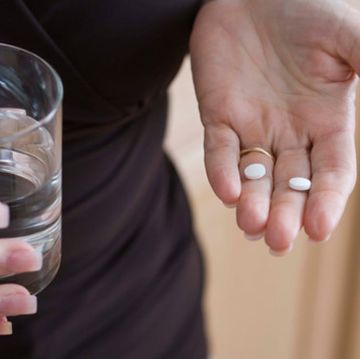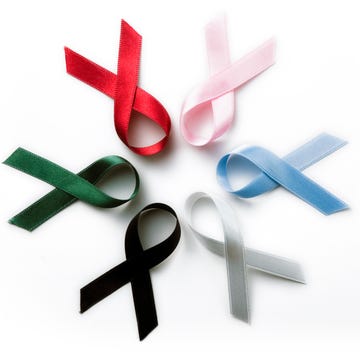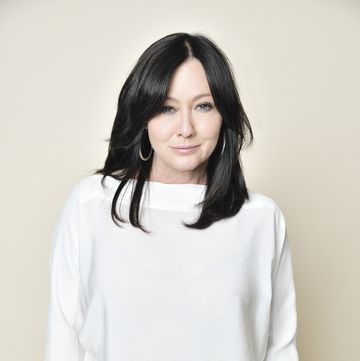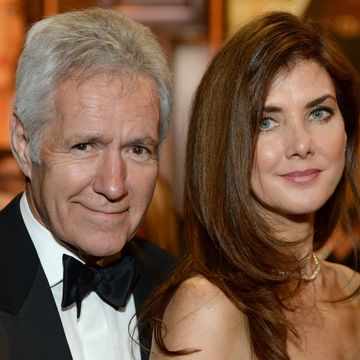Put down the pinot noir. While researchers have long linked heavy drinking to a greater risk of cancer, Harvard scientists have found the most conclusive evidence yet that just a single glass of wine each day may be too much for women with a family history of the disease.
"Consumption of up to one standard drink a day increases the risk of alcohol-related cancer, mainly breast cancer, by 13%, compared to non-drinkers," reports study co-author Yin Cao, a postdoctoral research fellow at the Harvard T.H. Chan School of Public Health and Brigham and Women's Hospital in Boston. (Looking for more health tips? Get your FREE trial for Prevention + 12 FREE gifts.)
In the study, published by the BMJ, the researchers looked at data from two large American studies—the Nurses' Health Study (NHS) and the Health Professionals Follow-Up Study—to examine the health habits of more than 88,000 women and 47,000 men over a 30-year period, since 1980. The study subjects were light drinkers, coming in at or under the current recommended limit of one drink a day for women, one to two for men. Some of them had smoked at some point in their lives, and others hadn't. For men, smoking status made a difference, hiking their risk of alcohol-related cancers. For women, it made no difference. Even those who had never smoked showed a higher risk of breast cancer from drinking just one glass of alcohol a day. "Smoking is minimally associated with risk of breast cancer," Cao explains, which is why it didn't seem to have much impact on women in this study. "In contrast," she says, "in men, smoking is a risk factor for all alcohol-related cancers."
MORE: 5 Signs You're Not Getting Enough Vitamin D
The researchers estimate that alcohol is behind 3.6% of all cancers worldwide—1.7% in women and 5.2% in men. Alcohol intake has been linked to a greater risk of several types of cancer, including cancers of the colorectum, female breast, oral cavity, pharynx, larynx, liver, and esophagus, Cao says. Among heavy-drinking men, colorectal cancer is the major alcohol-associated cancer. For their female counterparts, it's breast cancer.
"Breast tissue may be more susceptible to alcohol compared to other organs," Cao explains, noting that if they hadn't considered breast cancer in this study, light to moderate drinking wouldn't have shown an uptick in risk of alcohol-related cancers in women at all. "Probable explanations involve increased estrogen and androgen levels," she adds.
More than 100 epidemiologic studies have linked alcohol with a greater risk of breast cancer, according to the National Cancer Institute. In findings from Oxford University's 2009 Million Women Study, every 10 grams of alcohol (about two glasses) consumed per day was associated with a 12% jump in breast cancer risk. Binge drinkers also fared badly, showing a higher breast cancer risk than non-bingers, in a 2012 Harvard study.
[block:bean=sub-offer-realtips-flexblock]
It's true that red wine may have certain health benefits—including lowering the odds of heart disease and degenerative diseases such as Alzheimer's, according to the National Institutes of Health—but now it seems that the risks may outweigh the benefits for women who are vulnerable to breast cancer. "For people who drink, decisions on levels of alcohol consumption should take into account history of smoking, family history of alcohol-related cancers, and risk profile for cardiovascular diseases," Cao advises.
MORE: 6 Alternative Doctors You Should Consider Seeing
In an editorial accompanying the study in the BMJ, Jürgen Rehm, MD, of the Centre for Addiction and Mental Health in Toronto, gave bottom-line advice, writing: "People with a family history of cancer, especially women with a family history of breast cancer, should consider reducing their alcohol intake to below recommended limits, or even abstaining altogether, given the now well established link between moderate drinking and alcohol-related cancers."














